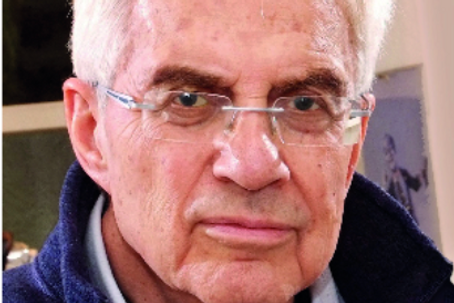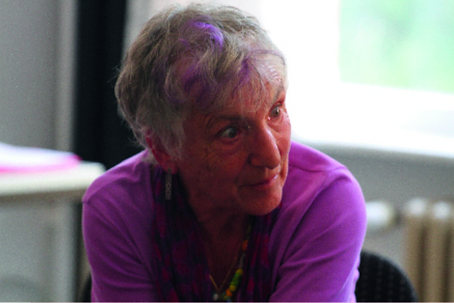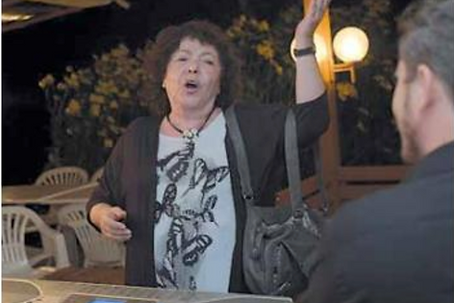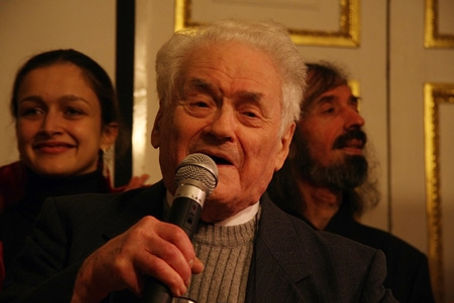
Zeitzeuge
Assia Gorban
Pädagogin, Mitgliederin des Präsidiums der Repräsentantenversammlung und Schoa-Überlebende des Ghettos Mogilev in Belarus und des Todeslagers Pechora in der Ukraine.
Assia Gorban kümmert sich seit 30 Jahren ehrenamtlich um Senioren in Gemeindeeinrichtungen in Berlin.
Liebe Freunde,
ich freue mich, wieder mit euch in Kontakt zu sein, auch wenn meine Worte hier auf der Website bleiben! Ich habe mich damals so gefreut, als ich Eure Zeichnungen in der James Simon Galerie bei der Gedenkzeremonie gesehen habe, und Ihr wart so organisiert und professionell bei der Veranstaltung - jeder war an seinem Platz. Ich weiß, das ist ein großes Lob für Eure Betreuer*innen. Das schöne Plakat, das ich von euch bekommen habe und für das ich mich bedanke, werde ich später dem Museum unserer jüdischen Gemeinde übergeben. Obwohl ihr alle aus verschiedenen Ländern und aus verschiedenen Gründen nach Deutschland gekommen seid, habt ihr bei J-ArtEk Wärme und große Hoffnung auf eine bessere Zukunft gefunden.
Ich wünsche Euch Gesundheit, Glück und Erfolg in allem.
Eure Bewunderin und Freundin Assia Gorban
J-ArtEck Camp 2024
(Ehemann von Ruch Schwiening), UK
Jurgen Schwiening
I would like to thank you again for inviting me to accompany Ruth to your ArtEck camp. For me it was a great experience. I enjoyed the company of young people, particularly since they were from so many different countries. You looked after them and us very well. For Ruth it was even more important. For her, coming to England had been a very traumatic experience. She felt appreciated by you and the young people. It was like a 'coming-out'.
I just wish I would have understood more of what was being said. Would it be possible to let me have a German or English version of the whole program? I only have a vague idea of what the youngsters did during the rest of the course. I know you intended to re-introduce them to their Jewish background which had been lost in many cases.
Best wishes, Jurgen
J-ArtEck Camp 2013
Frank Meisler
Former child refugee, sculptor and architect. Israel.
We were most impressed by the character and atmosphere which we found at the International camp "Jewish Arteck". It was obvious that the students were enthusiastic and ready to learn more about their Jewish roots and traditions. The madrichim were friendly and efficient. From our personal encounters as eye-witnesses of Nazi Germany and members of the Kindertransport we realized that the students were truly interested to learn about those times. The questions they asked were to the point and it seemed to me that our dialogue was successful.
The function at the Kindertransport sculpture in Berlin center was very moving for the children as for the eye-witnesses (Kinder) who attended this.
I congratulate Ms. Ella Nilova and her staff on a very well organized and interesting summer camp.
J-ArtEck Camp 2013
Ruth Schwiening
Former child refugee, teacher and artist. Bermingham, UK
It was such a pleasure for Jurgen and me to be invited to attend Arteck in Brandenburg this summer. We had no idea what to expect and went full of anticipation. I was asked to give a Master class in art and to show the children how my work had been influenced by my Jewish background. Jürgen was to contribute by giving an introductory talk on the reasons why the Kinder Transport took place. A taxi fetched us from the airport to the camp. The drive from Tegel to Brandenburg took us through some beautiful countryside. On arrival we were surprised that we didn't have to stay in a tent but were shown into our most comfortable room. Ella, the organizer of this project and her colleagues were extremely helpful and caring. They did their best to make us feel at home. On Friday evening we were invited to join everybody to celebrate Shabbat. The service was in Russian but we were provided with a translator so we could follow everything. On Saturday, after a good breakfast and given time to go for a walk we enjoyed the surrounding scenery. What a wonderful setting! During the course of the afternoon we gave a talk on our experiences on the Kinder Transport and told our personal story. There were three of us who had come over on the Transport. The talks were in German and English. Once again our talks were translated into Russian. Nobody was excluded.
Later the youngsters were divided into smaller groups where they were encouraged to ask questions. The youngsters bombarded us with questions. They did this with great enthusiasm, curiosity and intelligence.
The practical workshops were a culmination of what they had assimilated during the talks. They painted pictures, many of which were full of feeling and so professionally executed. I was much moved.
The evening was such fun. The youngsters put on a concert and a sketch in English in our honor.
Sunday was a day out in Berlin. We went to an exhibition on "Diversity and Decadent Art." We all went to the Friedrich Strasse and held a memorial service in front of the Statue "A Train to Life and a Train to Death". For me and I am sure for all those who were present that it was very touching. I was asked to light a candle for all those relatives and others who did not survive. As I was lighting the candle my thoughts went out to the "lost generation" on the "Train to Death". I said a silent Kaddish, looked around and saw so many children in tears. They had been affected by their Jewish history. The Shoah had marked them.
Here I must say that the experience we had at the camp was unforgettable. The warmth shown to us by everybody was insurmountable. It was indeed an example of how children can bond in love in spite of different backgrounds and countries. It was a true example of tolerance and understanding. I feel sure that these youngsters will grow up with a greater knowledge of their history and will appreciate all that has been offered to them during this Artteck Summer course. It was far more than a "summer camp". It was a positive lesson in "Life". Thank you all for allowing us to take part in Jewish Arteck 2013. A special thanks to Ella and the wonderful group of helpers but a very special thanks to the youngsters who have enriched Jurgen and my life.
J-ArtEck Camp 2013
Ruth Barnett
a Holocaust survivor and educator, London UK
75 YEARS ON – JEWISH ARTECK AND THE KINDERTRANSPORT
Jewish Arteck is a summer youth camp like no other. It operates in a lovely setting on the banks of the Uedersee, an hour’s drive North of Berlin, with all the sport and leisure activities you can imagine. But it is the energy, imagination and hunger for learning brought by youngsters and their leaders from Russia, Israel, Germany and America that creates the magical and powerfully inspirational experience of being part of Jewish Arteck. I had the privilege to be invited to Jewish Arteck 2013.
Ich bin eine echter Berlinerin, born in Wilmersdorf 23/1/35 and living in Charlottenburg until the November Pogroms in 1938, after which I came to England on the Kindertransport at age four with my seven year old brother in 1939. It took all of 50 years (until the first reunion of Kindertransport in 1989) before I could come to terms with my German past and reclaim my Berlin roots. Now, proud to be a Berlinerin, I welcome every opportunity to spend some time in ‘My City’.
In 2012 I signed up for Limmud.de in Berlin’s old Jewish High School and met Ella Nilova who, to my delight invited me to Jewish Arteck 2013 to take part in its core theme – the Kindertransport. So, together with Ruth and Jurgen Schweining and Frank Meissler (sculptor of the Kindertransport memorials who came with two friends), I spent three memorable days as part of Jewish Arteck. We all learnt together through creating a number of informally structured events. A truly international ambiance was provided by translation into all four languages by the skilled leaders.
The children had already had three days to do a lot of creative thinking and practical preparation before we arrived on July 12th in time for Shabbat. Out of an excited chaos of 64 jostling jabbering children and youth leaders emerged a joyful Cabbalah Shabbat service. The room was decorated with colorful posters, an Arc and lots of candles, most of which were made, but all of it prepared, by the children. Stas playing a haunting but joyous trumpet solo ushered in silence and a service that had everyone gripped. Many of the children were experiencing a Jewish Shabbat for the first time. After this the Shabbat meal was followed by an oneg/cabaret produced by groups of children with their leaders: songs, games, dance and story-telling prepared to entertain their guests – us!
Shabbat was then devoted to learning about the Kindertransport through an informal ‘Talk Show’ in which the four guests each gave a brief introductory talk. After this we were each ‘interviewed’ by a smaller group in four different rooms. Despite the translation into the other languages, I have never experienced quite so many interesting challenging and searching questions. The encounter with my group was an inspiring experience and, as I gathered, so were the others. 64 ambassadors who I am sure will raise awareness of the wider meaning of the Holocaust in the difficulties we still have currently in embracing diversity. After lunch we did some debriefing and processing of the morning’s experience through active workshops in small groups.
Finally, the children prepared their previously rehearsed after dinner cabaret, presented as “English Tea”, sitting round candle-lit tables for tea and cakes, with 1920s background music and little ‘acts’ on the theme of ‘Englishness’ to honour us, their ‘English guests’. What a Shabbat! One I will never forget.
Sunday followed with a very moving commemoration of the Kindertransport at the Friedrichstrasse memorial which had been sculpted by Frank Meissler – readings, candle lighting, music, and memory stones – all very impressive as everyone had been issued with a red or blue tee shirt with the Jewish Arteck logo. After a picnic lunch in the Lustgarten, we had a guide to explain the pillars that were there as one of 11 sites in Berlin representing “Zerstoerte Vielfalt” (Destroyed Diversity) to commemorate the Nazi intolerance of diversity and modern culture. The final visit was in the Ephraim Palais to see the collection of “Entartete Kunst” (degenerate art). This is a collection of paintings that survived as the Nazis used it for touring Germany as an example of ‘bad art’ and now it has become an example of ‘degenerate Nazi culture’!
This was an unforgettable three days out of the ten days organised for this international group of young people by an equally international, dedicated and talented team of youth leaders. 2013 is the 8th year of Jewish Arteck and I hope it will continue for many years to come. Not only does it enable Jewish youth to reclaim and enrich their Jewish culture but also it does so through unique informally constructed events those tap the abundance of curiosity, imagination and enthusiasm of all who meet for the encounter.
J-ArtEck Camp 2013
Hellmut Stern
Musiker, 84 Jahre Alt, Berlin
Die Jugend kann ihre Zukunft nur gestalten, wenn sie soviel wie möglich von der Vergangenheit erfährt. Dieses Wissen aber kann ihr nur vermittelt werden, wenn erfahrene Zeitzeugen und Historiker gemeinsam sich bemühen in jugendgerechter Weise das Geschehene darzustellen. „Jüdisches ArtEck“ ist eine der Organisationen, die sich bemüht jungen Menschen unterschiedlicher Herkunft die geschichtlichen Zusammenhänge zu
vermitteln.
Die Erfahrungen der Verfolgungen der deutsch-jüdischen Bürger von 1933 bis 1945 die letztlich zum Holocaust führten, sind ein besonderes Thema im Geschichtsgeschehen. Denn die deutschen Juden waren voll integriert in die deutsche Gesellschaft, sie hatten einen wesentlichen Anteil an deutscher Kultur, deutscher Wissenschaft, Medizin, Technik usw. Umso schlimmer traf sie die Übernahme staatlicher Macht der Nationalsozialisten und ihrer verbrecherischen Ideologie.
Ich bin jetzt meinem Alter entsprechend Zeitzeuge und in dieser Eigenschaft hatte ich auch die Ehre von „Jüdisches ArtEk“ zu einem zweitägigen Besuch eingeladen zu werden. Die Diskussionen mit den vielen
jungen Menschen waren für mich ein großes Ereignis. Diese Jugendlichen gehen nach hause mit einem Wissen der jüngeren Geschichte, das sie in ihre Zukunft
begleiten wird und sie vielleicht nicht so manipulierbar machen wird, wie leider so viele Menschen in dieser instabilen Welt. Ich wünsche dem „Jüdischen ArtEck“ und seinen hervorragenden Mitarbeitern weiter viel Erfolg bei ihrer wichtigen und verantwortungsvollen Aufgabe!
J-ArtEck Camp, September 2012.
Uri Orlev
writer, Jerusalem
Thanks a lot for the wonderful, meaningful Experience we had shared with you in the camp and the
city. We were really impressed by the high level of your activities in the camp and the serious
attitude as well as the positive energy of the youngsters, with whom we stayed for several days.
We wish you all the best.
Annabella Kellner-Yakov
Schauspielerin im "Yidishspiel", Tel-Aviv
Es war ein einmaliges Erlebnis - das Treffen mit einer so wundervollen jungen Generation, welche sich für Jiddisch interessiert. Ich bin denjenigen sehr dankbar, die es mir ermöglicht haben das ArtEck zu besuchen. Ich habe mich wie zu Hause gefühlt und ich wollte singen! In Deutschland zu sein und sich mit jüdischen Kindern ausgerechnet mit Jiddisch zu beschäftigen, das ist meine größte Rache für meine verlorene Kindheit.
Ich werde nicht müde, in Israel den „Sabras“ und überall zu wiederholen: Nicht immer war es so, dass
die Juden ihr eigenes Land und so viele Möglichkeiten hatten. Ich bin ein Kind des Krieges und war ein Jahr alt, als unsere Familie aus Chernovcy nach Transnistrien deportiert wurde. Es ist viel Zeit vergangen, nach dem ich als eine Schauspielerin in den 70ern das erste Mal nach Deutschland kam und stehend auf der Bühne Scholem Alejchem deklamierte. Die ganze Zeit dachte ich nur: ich lebe, wir leben, wir haben eine Zukunft. Jetzt spüre ich noch mehr, wie wunderbar, klug und selbstbewusst unsere zukünftige Generation ist und dazu vergisst sie auch nicht unser Mame-Loshen, unser Jiddisch. Ich wünsche mir, dass es nicht nur bei diesem fabelhaften Projekt bleibt, sondern Jiddisch auch weiter der jüdischen Jugend, in allen Ländern hilft, ein gemeinsames Volk zu bleiben.
Arkady Gendler
Pädagoge, Sänger und Komponist, Saporozhje, Ukraine
Jiddisch. Auf dieser Sprache redeten die Juden des östlichen Europas, des westlichen Europas, Juden
im Osten und im Süden. In dieser Sprache wurde vom Ende des 18. Jh. bis zur ersten Hälfte des 20. Jh. so viel Kultur erschaffen – Belletristik, Poesie, Musik und Dramatik, was sehr unwahrscheinlich irgendeine andere Sprache in einer so kurzen Zeit geschafft hätte.
Die Jiddische Sprache – weich und musikalisch. Auf ihr kann man jedes Gefühl und jede Emotion
rüberbringen. Egal ob Freude, Trauer, Liebe oder Hass, Wut oder Friedfertigkeit. Es ist toll zu sehen, dass die Rückbesinnung selbst zur jiddischen Kultur, von dem jüdischen ArtEck unternommen wurde und ich hoffe auf eine erfolgreiche Weiterführung in diese Richtung. Es ist ein wichtiger Schritt zur Wiederbelebung der jiddischen Sprache und dessen Kultur. Welche weltweit anerkannt und schon von der Czernowitz-Konferenz in 1908 zur Nationalsprache des jüdischen
Volkes erhoben worden ist.












